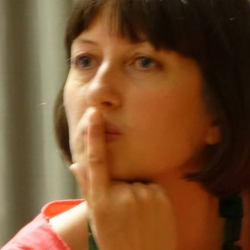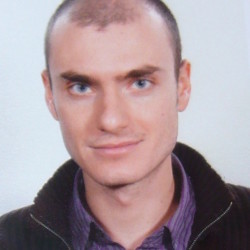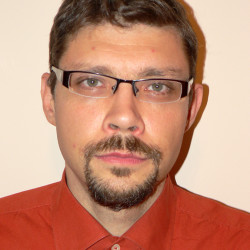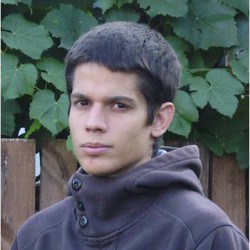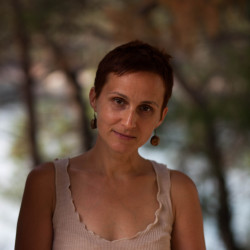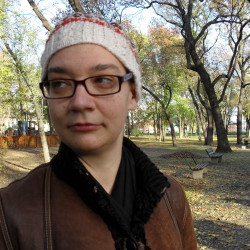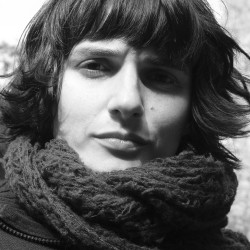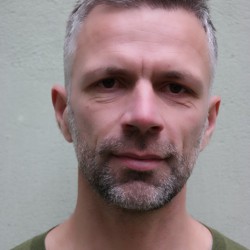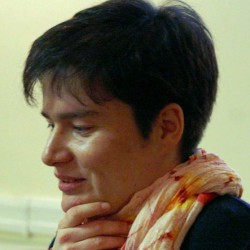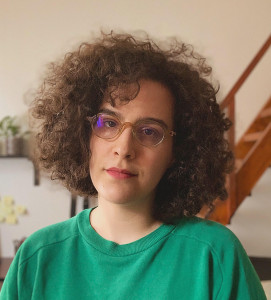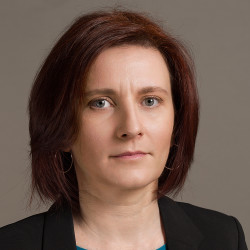Dánél Mónika
Mónika Dánél, PhD, is Assistant Professor in the Comparative Literature and Cultural Studies Department, Eötvös Loránd University, Budapest. She is currently leader of the project “Space-ing Otherness. Cultural Images of Space, Contact Zones in Contemporary Hungarian and Romanian Film and Literature” Her research is on the codes of intimacy and publicity in postcommunist cultures. In 2015 she was granted the János Bolyai Research Scholarship for three years. She coedited the volume Event-Trauma-Publicity (2012) and authored the monograph in Hungarian language Transparent Frames. The Intimacy of Reading (2013).
Gyenge Zsolt
Zsolt Gyenge este lector universitar la Universitatea de Arta si Design Moholy-Nagy din Budapesta, unde preda cursuri despre teoria si istroia filmului si despre teoria comuncarii vizuale. Cercetarile sale se orienteaza spre teoriile de interpretare (fenomeneologie, hermeneutica) si spre filmu experimental si arta video. Titlul disertatiei sale a fost Imagini, imagini miscatoare, intelegere: o teorie fenomenologica a analizei de film. Este redactorul revistei stiintifice Disegno.
Győri Zsolt
Zsolt Győri graduated at the University of Debrecen, his majors were English and Philosophy. He is employed as an assistant professor at the English-American Institute of the University of Debrecen. In his PhD dissertation (2007) he proposed a reading of Stanley Kubrick’s films through Gilles Deleuze, whose film philosophy he has used extensively ever since. Other fields of research include the relationship of film and society, the connection between cinema and ideologies, and the history of British cinema. He is the editor of a collection of academic essays on the latter topic and the co-editor of a volume dedicated to the relationship of body and subjectivity in post communist Hungarian cinema. His volume Films, Auteurs, Critical-Clinical Readingsappeared in 2014. He published articles, essays and gave conference lectures extensively in the above mentioned fields. At present he is member of the research project Space-ing Otherness. Cultural Images of Space, Contact Zones in Contemporary Hungarian and Romanian Film and Literature and another one: Gender, Translocality and the City Research Project.
Hlavacska András
András Hlavacska completed his BA at the Department of Hungarian Language and Literature of Eötvös Loránd University in 2011 and he obtained the master’s degree in 2014, at the Department of Comparative Literature and Cultural Studies of the same university. Since then he has attended the Comparative Literature PhD program. His main areas of interest are the fantastic genre and the relation between the ghost stories of the nineteenth-century and the early silent movies. He has been publishing articles in these topics since 2012.
Király Hajnal
Hajnal Király is a post-doctoral researcher at the Centre for Literary and Cultural Studies, Eötvös Lóránd University of Budapest. She is member of the research project Space-ing Otherness. Cultural Images of Space, Contact Zones in Contemporary Hungarian and Romanian Film and Literature, and is also collaborating with a project on intermediality in Central and East-European Cinemas, conducted by Ágnes Pethő at Sapientia Hungarian University of Transylvania, Romania. Her previous post-doctoral research at the Centre for Comparative Studies, University of Lisbon dealt with cinematic re-mediations of literary works, especially in the films of Manoel de Oliveira. Besides contemporary Hungarian and Romanian cinema, her present research interests are medium theory, literary re-mediations and intermediality, recently with focus on painting and cinema, as well as the interferences between intermediality and the concepts of ‘figural’ and ‘figuration’. She published a book in Hungarian on adaptation theory, entitled Könyv és Film között. A hűségelven innen és túl (Between Book and Film. Beyond the Fidelity Principle). Her other publications appeared in collective volumes and journals, both at home and abroad.
Kalmár György
György Kalmár is lecturer at the Department of British Studies of the Institute of English and American Studies, University of Debrecen (DE), Hungary. He graduated at DE in 1997, his majors were Hungarian and English. He worked as a post-graduate researcher and visiting scholar at the University of Oxford,the University of Indiana at Bloomington, and ITAS in Spain. He gained a PhD in philosophy (2003) and one in English (2007) at DE. His main teaching and research areas include literary and cultural theory, film studies, gender studies, and British literature. He has published extensively in the above mentioned fields, mainly in established Hungarian periodicals. He is the author of three books, Szöveg és vágy: Pszichoanalízis, irodalom, dekonstrukció (Anonymus, 2002) (Text and Desire: Psychoanalysis, Literature, Decontruction), “A női test igazsága”: Esettanulmányok egy metafora történetéből Chaucertől Derridáig (Kalligram, 2012) (“The Truth of the Female Body”: The History of a Metaphor from Chaucer to Derrida),and Testek a vásznon: Test, film, szubjektivitás (Debreceni Egyetemi Kiadó, 2012) (Bodies on the Screen: Body, Film, Subjectivity).
Kovács Flóra
Flóra Kovács (b. 1982, Hódmezővásárhely), literary historian, external lecturer at the University of Szeged, editor of www.tiszatajonline.hu, and co-editor of the book series Szövegek között (Between texts), together with István Fried. She has been publishing in the fields of literary theory, drama theory and comparative studies. Her individual volume is entitled A közösség a kortárs erdélyi drámában és színházban (The community in the contemporary Transylvanian drama and theatre, 2013).
Kránicz Bence
Bence Kránicz (1991, Budapest) completed his Liberal Arts – Film Studies BA in 2013 at Eötvös Loránd University, where he’s currently completing his Film Studies master’s degree. He works as a journalist at the Hungarian news site VS.hu. His articles on film and comics have benne published in various journals and magazines since 2009.
Margitházi Beáta
Beja Margitházi PhD is a film theoretician, teaching at Film Studies Department of Eötvös Loránd University (Budapest, Hungary). She is a co-founder and editor of Filmtett (2001) monthly film magazine (now online as www.filmtett.ro). She is interested in questions of film style, the history of early film and the tentative multidisciplinary research possibilities of visual communication. Her book The Cinema of the Face. Close-up and Film Style (Koinónia, 2008) deals with historical and theoretical problems of the face close-up in film. She was the co-editor of Visual communication anthology (with Ágnes Blaskó, Typotex, 2010). Her studies, critical essays and translations since 1995 have appeared in different anthologies, and such periodicals and magazines as Színház, Ellenfény, Zsöllye, Korunk, Idea, Balkon, Filmtett, Filmvilág, Filmkultúra, Apertúra and Metropolis.
Sághy Miklós
Miklos Saghy is an assistant professor at the Department of Visual Culture and Literary Theory, University of Szeged, Hungary. His research interests are interrelations between film and literature, contemporary Hungarian literature and media theories. His books are: The New Hungarian Lyrics. Critiques of Contemporary Poetry. (In Hungarian with Ákos Tóth), 2004; The Rhetoric of Light. The Role of Technical Images in the Works of Iván Mándy and Miklós Mészöly (In Hungarian), 2009; The Future of the Cinema in the Digital Age. Database or narrative? (E-book in Hungarian with Zoltán Dragon), 2012.
Strausz László
Since 1998 László Strausz has been working as a freelance writer on film for various journals and websites. After receiving his MA in Philosophy at the University of Pécs, Hungary, he moved to the US to study at the doctoral school of the Georgia State University. Upon the completion of his dissertation on the development of stylistic norms in cinema, he worked for various universities both in the US and the UK. His research interests include cinema and historical memory, politics of style, Eastern European Cinemas, and the aesthetics and narrative theory of motion pictures.
Szűcs Teri
Terézia Szűcs is a literary historian, critic, independent researcher. She gained her PhD in 2009 at Eötvös Loránd University, Budapest. Her research focuses on the literature of the Holocaust, and Romani literature. She is the author of The History of Forgetting – The Witness of the Holocaust in Literary Works and editor of Representations of Jewish Identities in Twentieth Century Hungarian Literature.
Ureczky Eszter
Eszter Ureczky is junior lecturer at the Department of British Studies, the Institute of English and American Studies, the University of Debrecen. Her main field of research is contemporary British fiction, more specifically the representation of the diseased body and the history of medicine, which she interprets from the perspective of the medical humanities, post-structuralist, feminist and biopolitical theories. Her research interests also include food studies and the representation of eating and cooking in 20th century literature and film. Her film reviews and articles have been published in journals such as Metropolis, Prizma and Szkholion as well as in ZOOM series (http://ieas.unideb.hu/index.php?p=1223&l=en).
Varga Balázs
Balázs Varga is an Assistant Professor of Film Studies at Eötvös Loránd University, Budapest, Hungary.He writes and lectures on modern and contemporary Hungarian cinema, contemporary European cinema, production studies and documentaries.He has been teaching in Hungarian higher education since 1997, from 1993 to 2007 he also worked for the Hungarian National Film Archives. He is a founding editor of Metropolis, a scholarly journal on film theory and history. His current research project dealt with the post-communist Hungarian film industry and the changing cultural significance of Hungarian cinema.
Vidosa Eszter
Eszter Vidosa completed her BA at the Department of Hungarian Language and Literature of Eötvös Loránd University in 2011, and the Departement of Comarative Literature and Cultural Studies of the same university. Her main areas of interests are the studies of transgressive body, identity, and posthuman theories. She has been publishing articles since 2013, and she is currently attending the Hungarian Literature after 1945 PhD program since 2016.
Vincze Teréz
Teréz Vincze graduated at the Faculty of Humanities of the Eötvös Loránd University (ELTE) in Hungarian Language and Literature in 2000 and in Art Theory in 2001. She also completed studies at the Film Studies and Literary Theory programs of the same university. She received her PhD degree at the Doctoral Programme of Aesthetics, ELTE University, in 2009. The title of her thesis was „Auteur in the Mirror: (Re)interpretation of the author’s concept in contemporary self-reflexive films”. Prior to joining the Institute for Art Theory and Media Studies at ELTE as graduate teaching assistant in 2004, she taught Film history and Film criticism at the Film Studies program of the Vitéz János Catholic Teachers Training College in Esztergom (1999–2002), and she was visiting lecturer in History of film theory at the Department of Film Studies of ELTE (2002-2004). Since 2010 she is assistant professor at the Department of Film Studies of ELTE. She has been editor of Metropolis (Quarterly Journal on Film History and Film Theory – www.metropolis.org.hu) since 1999, and editor-in-chief between 2003 and 2009. (http://film.elte.hu/en/about-the-department/faculty/dr-terez-vincze/)
Vincze Ferenc
Ferenc Vincze is a research fellow at the Departement of Comparative Literature and Cultural Studies of Eötvös Loránd University, and he is also a lecturer here since 2006. He is a member of the research project called Space-ing Otherness. Cultural Images of Space, Contact Zones in Contemporary Hungarian and Romanian Cinema and Literature, the MTA-ELTE Association for General Studies of Literature Research Group, and he is associated with the Departement of Romanian Philology of ELTE. His first collection of studies is called Hagyományok terhe, which contains essays about Hungarian, German and Romanian literature. He wrote his PhD thesis about the poetry and the reception history of Jenő Dsida, which later got the title Az átmen(t)et(t) Dsida, and was published in 2011 by Kijárat. His main areas of research are the matters of regionality and identity, but he is also interested in the cultural significance of comic books, and the cultural representation of the army and the act of hunting.

